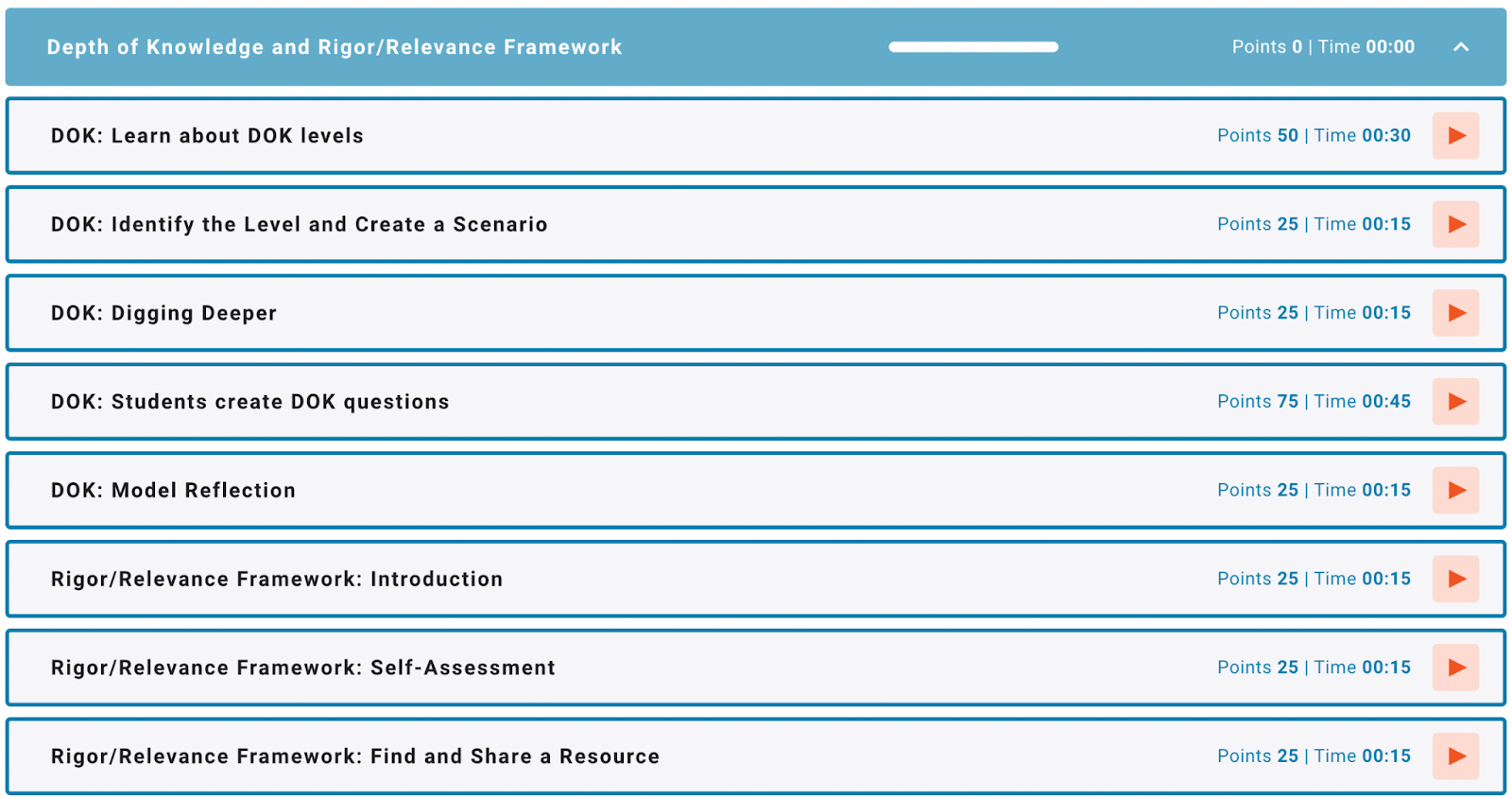5 min read
What is Webb's Depth of Knowledge? & 20 DOK Questions to Consider
Julia Francis : Aug 28, 2022 4:00:00 PM

“To know that we know what we know, and to know that we do not know what we do not know, that is true knowledge.” Nicolaus Copernicus
Thinking is hard work. Even the best students may feel fatigued after a period of intense brain activity and that can make it difficult for teachers to help students learn at a high level that pushes them academically without wearing them out. One thing that can help is categorizing tasks according to the complexity of thinking required to complete them by using Webb’s Depth of Knowledge.
At Alludo, we specialize in creating professional learning environments for educators and staff that provide access to tools they can use to connect with students and improve their learning. Webb’s DOK is part of our Alludo content catalog. Here is an overview of Webb’s DOK and 20 DOK questions for teachers to consider.
Table of Contents
- What is Webb's Depth of Knowledge?
- Why is DOK Effective for Teachers?
- Which Subjects Are Suitable for DOK?
- 20 DOK Questions for Teachers
- Alludo's Take
- Equip Teachers in Your District with an Understanding of Webb's Depth of Knowledge
What is Webb's Depth of Knowledge
Webb’s Depth of Knowledge is a system developed by Dr. Norman Webb in 1997. Its purpose is to categorize activities according to the complexity of thinking required to complete them. There are four levels of rigor in the DOK:
- Recall and reproduction. Tasks at this level are related to memory and rote recall, and may include things such as computing, copying, defining, and recognizing.
- Skills and concepts. Tasks at this level typically require more than one step and may ask the student to make a decision to complete the task. Examples include comparing, estimating, organizing, predicting, or summarizing.
- Strategic thinking. Tasks at this level have multiple steps and may have more than one answer that requires students to justify their thinking. Examples include analyzing data, solving complex problems, or designing an experiment.
- Extended thinking. Tasks at this level require complex cognitive effort and students may be required to synthesize information from multiple sources and use it to solve problems. Examples include designing an experiment and analyzing the results, analyzing multiple texts to identify a theme, or reading texts and emulating their style in their own writing.
/AL_11-Blog07-2.jpeg?width=450&name=AL_11-Blog07-2.jpeg)
Webb’s Depth of Knowledge is a framework that educators can use to assign tasks at an appropriate level that doesn’t overtax students and leave them without the cognitive energy to complete their work.
You may have seen a DOK wheel chart that has become popular. Dr. Webb did not create the DOK wheel and has discouraged its use as he believes that it oversimplifies the process of managing tasks by making teachers believe they can simply change a verb in the description of the task to make it more or less taxing.
Why is DOK Effective for Teachers?
Teachers find Webb’s Depth of Knowledge useful for several important reasons, but the most important thing to know is that it helps teachers avoid overwhelming students with too much intellectually rigorous work. Here are some of the benefits of DOK for teachers.
It Helps Teachers Design Instruction
Creating lesson plans is difficult work. Using Webb’s DOK can help teachers understand how students learn and which tasks require the most rigor and design their lesson plans accordingly.
It Helps Teachers Evaluate Lessons
Teachers can also use Webb’s DOK to evaluate existing lessons, define the amount of rigor required for them, and gauge whether learning is at the right level to support learning.
Using it Can Boost Student Engagement
Using Webb’s DOK to create and evaluate student lessons can boost student engagement because it reduces the likelihood that students will get worn out during a lesson or lose focus on a task. In that way, it can also support future learning because students who aren’t overusing their intellectual resources will be set up for better learning going forward.
It Builds Teaching Skills That Will Benefit Students
When teachers use Webb’s Depth of Knowledge as a tool to create lessons and evaluate them, they are building teaching skills that will make them better teachers and thus, benefit their students. Consistent use of DOK can make it easier for teachers to design lessons that develop critical thinking in their students and that sets students up for future academic success.
It Helps Teachers Think Creatively
Writing lesson plans and developing lessons requires a lot of creative energy on the part of teachers. Webb’s DOK gives teachers a framework to create lessons and using that framework can actually allow teachers to think more creatively about their lessons. Designing lessons at multiple levels gives teachers the opportunity to flex their creative muscles and have fun with lesson planning.
/AL_11-Blog07-3.jpeg?width=450&name=AL_11-Blog07-3.jpeg)
It Builds Evaluative Skills
Finally, using the DOK helps teachers to build evaluative skills that they can use in multiple aspects of their jobs. They may, over time, be able to evaluate lessons more effectively and recognize signs of intellectual fatigue in their students.
Which Subjects are Suitable for DOK?
Is it appropriate to use Webb’s Depth of Knowledge to create lessons in any subject or is it best suited for some and not for others?
The first thing you should know is that Webb’s DOK was originally developed for use in math and the sciences. When we review some of the levels, it’s easy to see why. In a science classroom, students might begin with memorization and recall of a new concept and later, move into predicting the results of an experiment. After that, they might design an experiment and analyze the results, thus moving through all four stages of the DOK.
However, DOK can be used in any subject because every subject that students learn incorporates tasks that require varying levels of cognitive rigor.
An example of how an ELA teacher could design lessons at each level might look like this:
- Level 1: Students memorize new vocabulary words.
- Level 2: Students organize vocabulary words by parts of speech.
- Level 3: Students write and parse sentences using vocabulary words.
- Level 4: Students write a story incorporating words from multiple lessons and emulating the style of a particular writer or genre.
While teachers can certainly use Webb’s DOK in any subject they teach, the most common use is in assessment creation by states. A state might use Webb’s DOK to formulate questions on a standardized test to determine whether students have met state standards.
Teachers can also use the DOK framework to evaluate their lesson plans and confirm that students are exposed to tasks at each level. We should note here that Level 1 and Level 2 assessments are the easiest to make since grading Level 3 & 4 assignments may take more time and be less objective as a measure of student progress.
20 DOK Questions for Teachers
One of the best ways for teachers to use Webb’s Depth of Knowledge is to break down questions for students into each of the four categories. Here are 20 DOK questions for teachers to use at each level:
- First level questions should be specific and to the point.
- What is _____?
- Can you identify _____?
- Which of the following _____?
- What is the definition of _____?
- When did _____?
/AL_11-Blog07-4.jpeg?width=450&name=AL_11-Blog07-4.jpeg)
- Second level questions should be used to launch exercises that build upon basic knowledge to help students gain understanding and acquire skills.
- How would you use _____?
- Can you summarize _____?
- Compare and contrast _____ and _____.
- What was the cause of _____?
- What is an example of _____?
- Third level questions should encourage complex reasoning and high-level thinking.
- Predict what would happen if _____.
- How would you test _____?
- How does the author _____?
- What evidence supports _____?
- Do you agree or disagree with _____?
- Fourth level questions should be open ended and encourage high-level strategic thinking.
- How would you prove or disprove _____?
- Design an experiment that would test _____.
- How would you evaluate _____?
- Assess the validity of _____.
- Apply _____ and determine _____.
These examples are illustrations of the kinds of things teachers might ask of students at each DOK level.
Alludo’s Take
At Alludo, we believe in giving teachers all the tools they need to help students learn and develop strategic thinking. It’s for that reason that we have included courses related to Webb’s Depth of Knowledge and Rigor in our Alludo content catalog.
Teachers who have a strong understanding of Webb’s DOK and how it works are empowered to use it to their advantage when assessing students, developing lesson plans to build strategic and complex thinking, and encouraging student engagement at every level.
To encourage teacher engagement, we’ve incorporated gamified learning and rewards into our professional development system and the school districts who have partnered with us have seen dramatic improvements in teacher engagement.

Equip Teachers in Your District with an Understanding of Webb's Depth of Knowledge
If you want to boost student learning and engagement, improve outcomes and test scores, and empower teachers in your district, using Webb’s Depth of Knowledge for assessment and lesson planning may be the answer.
Want to reach up to 100% PD in your district? See how Alludo can help make it happen with our free professional development platform trial, including:
- Hundreds of core topics
- Asynchronous microlearning activities
- Timely and specific feedback
- Analytics that show learning impact
- Access anytime, anywhere
Earn Continuing Education Units with Alludo & Fresno Pacific University
Earn Continuing Education Units from Fresno Pacific University!


